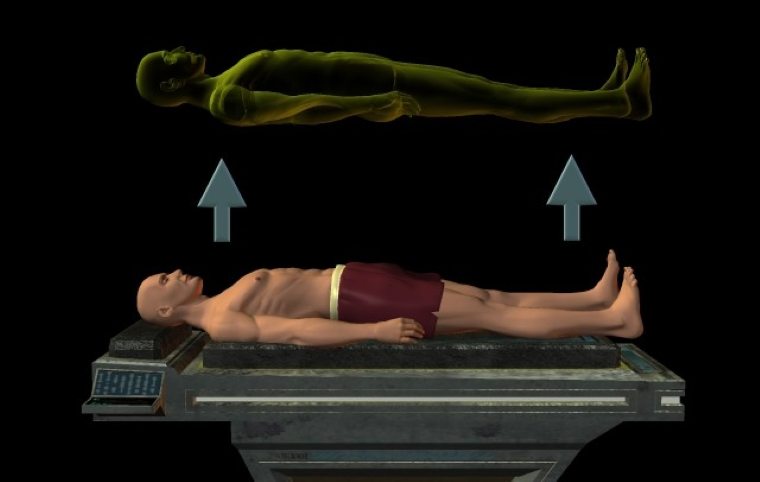Out-of-body experiences (OBEs), where experiencers feel like their mind and/or spirit is detached from their body, may be symptoms of traumatic experiences or high stress situations, new research has shown.
The new findings point to traumatic events, which often occur during childhood, as a likely cause of OBEs as opposed to poor mental wellness, as past research has suggested. The scientists behind the discovery suggest that viewing OBEs as symptoms rather than causes could improve treatment options for experiencers who have been diagnosed with a mental health condition.
“If OBEs are understood not as symptoms of pathology but as coping mechanisms – especially in response to trauma – this reframing can lead to several important shifts in clinical practice, research and public understanding,” explained Marina Weiler, PhD from the University of Virginia’s (UVA) School of Medicine and the lead author of a study detailing the findings.
The Connection Between Out-of-Body Experiences and Mental Health
Previous efforts to study out-of-body experiences found a statistical correlation to poor mental health. The authors of the new study say these findings, and the general attitudes of medical professionals tasked with understanding and treating experiencers suffering from both OBEs and mental health conditions, have resulted in experiencers avoiding seeking out treatment due to stigma.
“Many people believe that having OBEs means there’s something wrong with them, so they often keep it to themselves out of fear of being judged or seen as mentally ill,” Weiler, who is also a neuroscientist with UVA’s Division of Perceptual Studies, explained. “Unfortunately, many mental health professionals still view these experiences in the same way.”
Surprisingly, the researchers said that an examination of prior research into the potential causes and effects of OBEs revealed a much more nuanced picture where many people don’t consider the experiences themselves as negative. For example, many experiencers say they are more open to new ideas about the nature of existence, experience greater inner peace, and often report they are less afraid of dying.
According to Weiler and colleagues, one previous study found that 55% of experiencers felt the experience permanently changed their lives. 71% of the same study participants said they experienced lasting benefits of their OBE. And nearly half (40%) said the out-of-body experience was the single “greatest thing” that had ever happened to them.
Hoping to determine why something many consider beneficial was still treated as a cause of poor mental health and not a symptom of something else, the researchers collected online questionnaire data from OBE experiencers. Along with establishing whether the person was confident that they had undergone an authentic out-of-body experience, this questionnaire asked about the experiencer’s medical and mental health history.
Survey Results Show OBEs May Be a Symptom and Not a Cause
After reviewing the online survey responses, the team found several interesting trends. Four out of five respondents reported between one and four out-of-body experiences, while the remaining one out of five reported five or more OBEs. 74% of the experiencers described the event as “spontaneous,” 9% reported the use of psychoactive compounds in conjunction with the experience, and 8.2% described the OBEs as self-induced through meditation, visualization, or other non-pharmacological techniques. Only 0.7% reported hypnosis as the cause.
On average, Weiler said experiencers “tend to report poorer mental health” compared to non-experiencers, supporting the findings of previous studies. The results also showed that the younger the experiencer was during their first OBE, the more likely the experiencer was also diagnosed with a concurrent mental health condition.
Notably, the team found that the average first-reported OBE occurred at a young age, often during childhood, and experiencers also reported significantly higher levels of childhood trauma than non-experiencers. These correlations led the team to propose that OBEs may not be a cause, but rather a “dissociative response to overwhelming stress or emotional pain.”
“Our findings also suggest that OBEs may function as a coping mechanism in response to past trauma, rather than serving as a cause of mental illness,” Weiler said.
The researchers said this view of OBEs “shifts the focus from causation” to the possibility that OBEs “may also emerge as a consequence, a coping strategy for navigating difficult or traumatic experiences.”
Building ‘Community and Resilience’ Among OBE Experiencers
In the study’s conclusion, the authors reaffirm the idea that out-of-body experiences may be a reaction to events and that the correlation to poor mental health may, in some part, be attached to the unwillingness of experiencers to seek treatment. As a result, Weiller says she and her colleagues “encourage mental health practitioners to reconsider the way they interpret these experiences and to approach them with greater openness and sensitivity.”
The research team also suggested further research exploring the mental health care that OBE experiencers receive could further the goal of better treatment and reduced stigma.
“Ultimately, we hope to reduce the stigma around this topic, encourage help-seeking, and build community and resilience among experiencers,” Weiler said.
Christopher Plain is a Science Fiction and Fantasy novelist and Head Science Writer at The Debrief. Follow and connect with him on X, learn about his books at plainfiction.com, or email him directly at christopher@thedebrief.org.

